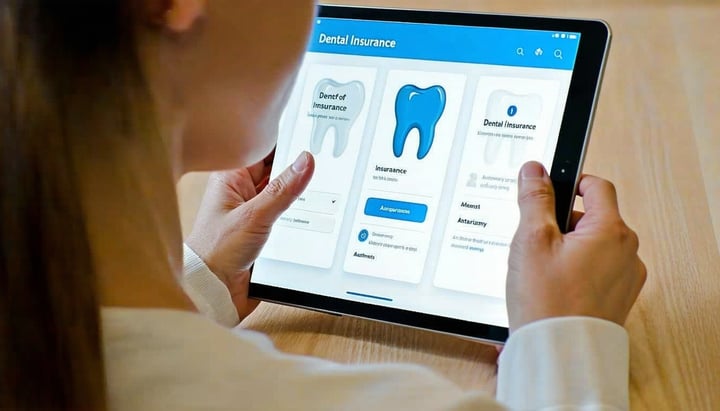By Andrew Hickey on Mar 27, 2025 @ 10:12 AM
The links between gum disease and overall health are clear and have been studied extensively for decades. From gum disease to Alzheimer’s disease, a problem with your teeth or gums could impact your health negatively.
Key Takeaways:
- The mouth is the gateway to your organs - and its home to thousands of bacteria.
- Poor oral health can lead to periodontal disease, gingivitis, and oral cancer.
- Your body can then also suffer from other conditions like cardiovascular disease, pregnancy/birth complications, diabetes, and Alzheimer’s.
- Dental insurance can help improve your overall health and save you money.
For those that are pregnant, health problems could impact your baby’s health as well. You can learn more about pregnancy health here.
At the same time, it is widely recognized that affordability is a key factor in the decline of dental care and effective dental hygiene. Many experts will cite it as the number one cause of gum disease. Still, there are ways that you can prevent gum disease and maintain good oral health.
Treatments can help to reverse many of the problems caused by poor dental health. As we delve into the link between gum disease and overall health, you can follow these oral health tips to keep your gums and teeth healthy. They will also help keep the rest of your body healthy.

Health Problems Caused by Poor Dental Health
Dental problems affect overall health because the mouth is home to thousands of bacteria. And the mouth is the gateway to every other organ in your body.
What you put into your mouth will not only go down the esophagus and into your stomach but will be broken down and distributed throughout your bloodstream. It may also cross the blood-brain barrier and enter your brain, negatively impacting your overall function. In some cases, this could result in permanent damage.
There are different oral diseases and conditions, which vary in severity, such as:
- Tooth decay: This starts as a simple cavity or hole in the tooth and can result in a broken tooth or even a lost tooth.
- Gingivitis: This is the start of a more serious condition and begins with inflammation of your gums.
- Periodontal disease: When gingivitis is left untreated, this becomes an infection in the bones and jaw.
- Food sensitivity: If you are unable to eat food that is too hot or too cold, this is a sign you are having gum or teeth problems.
- Oral cancer: This disease impacts 50,000 Americans annually and could be the result of poor dental health.
These conditions occur in the mouth specifically. Other health conditions can also occur throughout the body when periodontal disease or gingivitis is left unattended for an extended time. Let’s take a closer look at these issues.
- Endocarditis: This disease impacts the lining of your heart valves and chambers. This can occur when you have bacteria in your mouth that spreads from the bloodstream and enters the heart.
- Cardiovascular disease: It encompasses a wide range of conditions that can result in heart failure, stroke, and clogged arteries. When the gums are inflamed or infected, the bacteria can travel through the bloodstream and impact your heart.
- Pregnancy or birth complications: The same concept applies to pregnancy and childbirth. There is a wide body of research that indicates that pregnant women without good dental health gave birth to low birthweight babies and were also at a higher risk of premature birth.
- Pneumonia: Pneumonia can also be a leading problem caused by poor dental health. This occurs in the same way that cardiovascular disease occurs. The bacteria from the mouth can enter the bloodstream and cause a major infection of the lungs. Pneumonia is just one of many lung conditions that can be the result of gum disease or poor dental health.
- Diabetes: Clinical research and health care statistics indicate that people with diabetes are more susceptible to gum disease and other health problems. While consuming less sugar would be a simple solution to fewer dental problems there is more to it. Blood sugar control is managed by the pancreas and the liver. When those organs are fighting off other infections, blood sugar control becomes much more complicated, leading to worsened health.
- Alzheimer’s: Clinical studies, which exposed mice to periodontal disease, have shown inflammation in the brain and the neurons that connect to it. Even plaque formation on the teeth can result in the deterioration of myelin pathways in the brain, which act a layer of insulation. This a leading indicator of Alzheimer’s disease.

Dental insurance can help improve oral health.
Since we know that poor dental health can lead to many serious health problems, dental insurance is a sound investment. But many Americans do not know how important it is to overall health and may not even have dental insurance.
Affordability is frequently cited as the number one reason that many people miss dental visits. In some cases, it is just the perception of the cost of dental care that keeps people away. Many dentists and offices are willing to help find solutions for patients struggling with finances.
At least 70 percent of people with dental insurance will visit the dentist annually. By contrast, it is estimated that only 40 percent of people without insurance will visit the dentist.
Most dental plans cover basic preventive services, like exams and cleanings, to keep people healthy overall. If you require any other dental work having insurance will cut down what you pay out of your own pocket more than you may think.
Overall, having dental benefits will encourage you and your family to visit the dentist often.

Six handy oral health tips
In addition to good dental coverage, there are many things you can do at home to maintain oral health and prevent major gum disease or oral infections. Taking care of your oral health is important regardless of your financial position or whether you have dental coverage.
- Brush your teeth every day, twice if you can.
- Floss when you brush your teeth.
- Use mouthwash to help remove food from the crevices of your mouth.
- Eat healthily and avoid excess sugar - brush and floss after consuming sugar when possible.
- Watch your toothbrush for signs of age - replace it every few months, or even sooner if it gets too worn.
- See the dentist regularly – once or twice per year.
While many of these tips may seem like common sense, we know that life gets busy, and it is easy to forget steps here or there. Forgetting to brush or floss can quickly lead to gum problems. Ensuring you have good dental insurance coverage can also give you peace of mind when it comes to preventing diseases caused by oral health decline. Do some research on dental coverage, and you may find it more affordable than you think. Start your journey of good dental health today!
Call our sales team at 877.760.2247 or email Sales@SolsticeBenefits.com
Already have Solstice benefits?
See your plan details by going to https://www.mysmile365.com/ or calling us at 1.877.760.2247.





comments